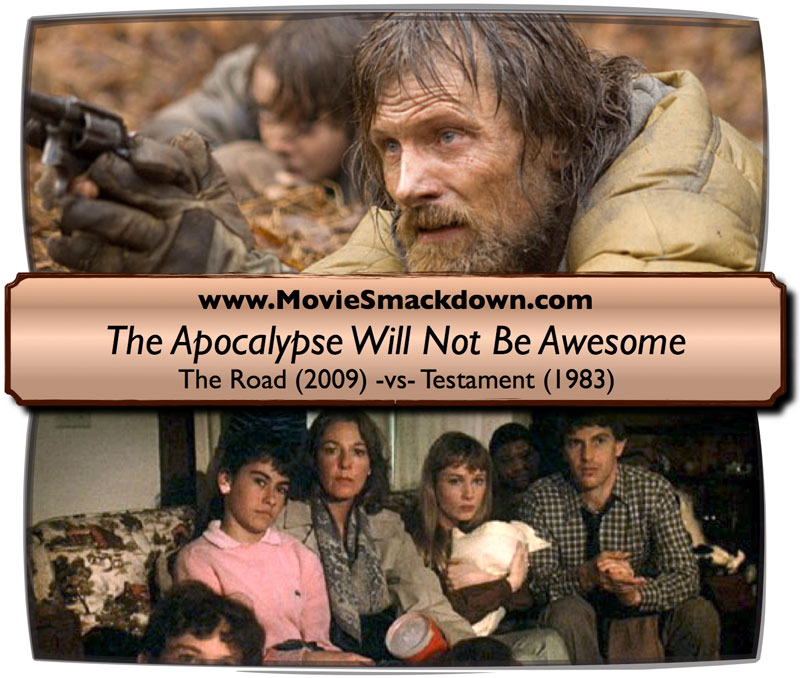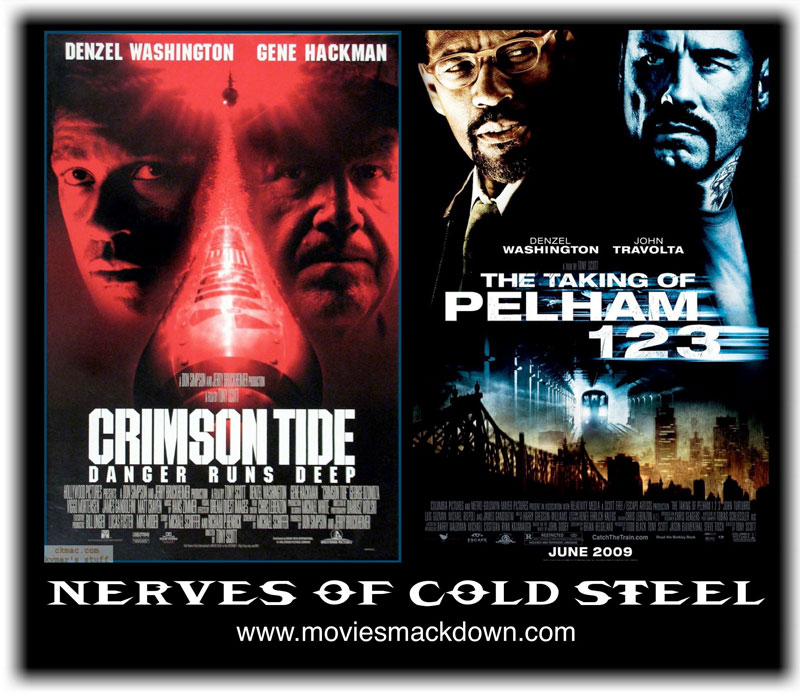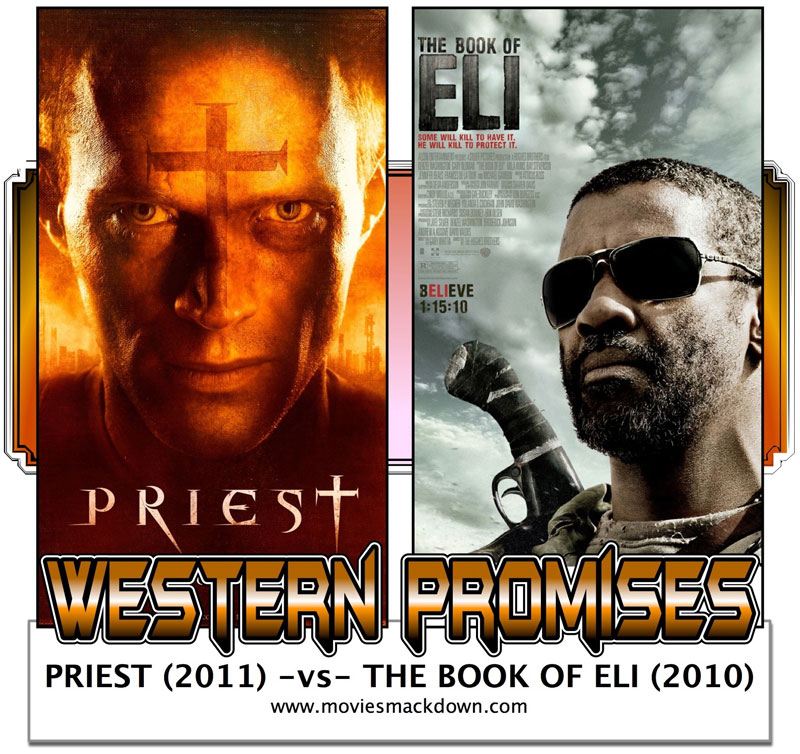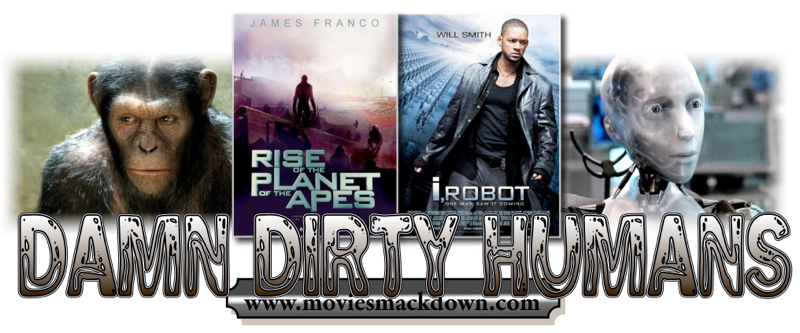
 The Smackdown
The Smackdown
Don’t get me wrong, I love a good apocalypse, but not all apocalypses are created equal. With films from this past year like 2012 and Transformers: Revenge of the Fallen tearing apart the planet to cheering audiences and huge box offices, you’d be forgiven if part of you thought that just maybe the apocalypse when (if?) it comes won’t be so bad after all. The truth is that it will be worse than bad, it will be awful, catastrophically so, and there probably won’t be a heroic third act resolution among the survivors. No, the survivors in a real end of days will have more on their minds than heroism, even if they manage to pull off a little nod in its direction. Both The Road (in theaters now) and Testament get dirty, showing characters coping with getting by once society disappears on them.
[singlepic id=299 w=320 h=240 float=right]
The Challenger
Based on Cormac McCarthy’s novel of the same name, The Road doesn’t even bother to really tell you what happened. All we know is that at 1:17am one morning, the sky lights up (nukes, asteroids, super-volcanoes?) and that’s all she wrote. This is the telling of two characters really, The Man (Viggo Mortenson) and The Boy (Kodi Smit-McPhee), who are trying to walk their way to the coast, close to a decade after that Minute When Everything Changed. Things are bad all over. Most everyone is dead now, food is all but gone, the animals have died, too, same with the plants. The closest thing to civilization are bands of brutal survivalists, and the most common form of human nature being expressed is cannibalism. Why distributors decided to release this film on Thanksgiving Day may go down as one of the most inexplicable calls in movie history. The book has legions of fans, and I first experienced it as an audiobook, which I listened to on a daily walk through our local green belt. I think of this film in the rhythm of walking but it gets in your head, and the day after Thanksgiving Day, I simply had to see it at the only local theater playing it. Then today, my youngest son realized he had to see it, too, and it was time for another Doomsday Road-trip.
[singlepic id=62 w=320 h=240 float=right]
The Defending Champion
Testament is another one of those films I had to see by myself, because my wife (even before I married her) simply couldn’t face the depression she knew would come from its subject matter. To understand, you have to go back to 1983, when the entire world was worried that the delicate balance that kept the world alive was going to get away from us all, the nukes were going to fly, and that once they did that would be all she wrote. This film concerns the Wetherly family, living in the San Francisco suburbs, and what happens to them after nuclear war destroys all the big cities. At first they try to carry on, even to the point of holding the school play so the kids won’t freak out, but help never arrives. The power’s off, the water’s gone, the trash isn’t being picked up. Then people start dying of radiation poisoning, the youngest and the weakest first, but everyone knows there will be no escape. The film grinds forward toward its inevitable conclusion.
The Scorecard
Both these films take the inciting incident of the apocalyptic event and put it off camera. They’re concerned with not how we get there but what we do once we’ve arrived. This is a wise decision on both counts, turning the films into character pieces and really allowing the audience to ask as they watch: “What would I do?”
Jane Alexander got an Oscar nomination for her role as Carol Wetherly in Testament and if The Road had been slightly more popular, it would be a sure thing that the same recognition would go to Viggo Mortenson for his role as The Man. Alexander and Mortenson are both superb. Besides the sheer acting chops, though, both performances as written have a lot to say about sex roles. Alexander’s mother decides to stay put and keep the family protected and together as long as she can. Mortenson’s father decides to take action, to get on the road no matter what the dangers and to forge onward. It’s emotional protection versus trying to fix the problem, something counselors regularly cast in Venus and Mars terms with their patients.
Both films have the potential to make you cry. If you don’t at least gasp in sadness a few times in each, you probably have no heart, or you’re a 13-year-old boy who thought you were seeing the sequel to Armageddon or Independence Day or The Day After Tomorrow. There is a scene in Testament where the mother takes the precious batteries they’ve been using for flashlights and other emergencies and loads up the boom box. She plays a Beatles song and dances with her young son before he dies. It is so sweet and awful and powerful that I could barely watch. The Road has fewer outright tear jerkers, but it is authentic and real within its own context, and that uncompromising stance just pounds away at you.
Both are powerfully well-written. Testament comes from an acquaintance, John Sacret Young, adapting a story by Carol Amen. The Road has a screenplay by Joe Penhall, but the true driving spirit comes from the McCarthy book. Each draws its central power from the observance of the changed mundane tasks of life.
There is a very central premise issue on The Road. It assumes that the mother is the one to desert her family and her son, leaving the father to carry on. Several women I’ve spoken to find that a deal-breaking premise. They think mom would stand by no matter what (like she does in Testament). My opinion is that anybody can break when hope leaves, and no sex has the market cornered on putting up with it longer. Besides, Cormac McCarthy made that central decision in the book, and that’s that.
In any case, direction is best on The Road, because John Hillcoat has masterfully recreated the bleak landscape, physical and emotional, from the largest to the smallest details. He could have gone into Mad Max territory but never does, not even a little. Testament feels limited, like a TV movie (albeit a very good one), but was only modestly directed by Lynne Littman in what I think was a first-time effort.
The Decision
Testament is a film of its time, like the similarly themed The Day After, Threads, and Special Bulletin. The Road, however, feels timeless. It is the story of immense sadness, seeing the Earth we love reduced so terribly. It’s like seeing a once vital parent, who always made you feel safe and secure, now hooked up to a respirator, aged and dying. At some point, in theaters now or on DVD later, seek out The Road and watch it.




I still like “Testament” more.
Sorry, I just don’t buy either of these. I think there’s a real reason that “The Road” flew far under and below a lot of people’s radar’s this year. It’s just not that good, and honestly — not a lot of surprises along the way to be had, and a rather hum-drum plot.
I’m not saying I want constant climax. I just want some hard choices, and not the same hard choices every fifteen minutes. How many times can the father tell the kid to kill himself? How many times can the compassionate child debate with his war-weary father the ethical dimensions of post-apocalytpic hospitality? If I didn’t get it with The Old Man, I definitely got it with The Thief.
Not to mention that the character choices are so ambiguous and loosey-goosey that you can’t place them. For example, The Father’s decision to return the clothes really just shows the same “listening and caring for his child’s emotions” from the film’s beginning and not as a growth for his character in terms of compassion — it’s also a waste action too little, too late. The film’s most important moment is “I HAVE TO WORRY TOO” and it comes off whiney and sort of untrue. That father, by far, has more to worry about.
But Viggo comes off as a complete jerk setting a bad example for his son, and his line “we’re the good guys” seems false and self-convincing — and cruelly misleading to the child he’s lying to. Not to mention, that by the end of the film, a lot of his father’s paranoia is moot as his son conveniently falls into the arms of a random family whose been following them (which sounds more like a scavenging predator’s game than a welcoming family).
I like the questions raised, I just don’t like how they’re framed, explored, and answered — often times in the most predictable and unimportant fashion. By the end of the film, I kept asking myself what did these characters actions have to do with anything, what did they mean, when the boy remains just a boy reduced to a second-class family member with a roaming family. Answer: nothing.
Everything in that movie ends up being a film for experience, and not message or point or interest, and it just doesn’t go anywhere. Haha, “The Road” is a road that leads to nowhere!
Anyway, yeah.
Falling somewhere between art-house picture and sci-fi extravaganza, “The Road” is certainly not what it has been marketed as. In the hopes of reaching mainstream audiences, the Weinsteins tried their best to sell it as a fast-moving apocalyptic thriller, but within the first ten minutes audiences will realize it is anything but. “The Road” strips away the “cool” from the end of the world, distancing itself from the likes of “Mad Max,” “28 Days Later” and (what would appear to be the case with) “The Book of Eli.” Instead it offers up a much more disturbing and honest depiction of the end of everything. It is a tough, extremely trying story. It does not coddle. It does not rush.
In a genre that largely focuses on what’s and why’s, “The Road” instead seeks only to observe the emotional power of its unnamed characters, two interdependent people whose love for one another drives the narrative and whose perceptions of their situation define its structure. It is an examination of parenting set against the backdrop of hopelessness. In the lead role, Viggo Mortensen once again shows why he is one of our greatest living actors, and young Kodi Smit-McPhee delivers a powerful performance as his son and moral compass. They are accompanied by a star-studded supporting cast, with Robert Duvall, Guy Pearce, Charlize Theron and Michael K. Williams (as Old Man, Veteran, Wife and Thief, respectively) all offering truthful representations of the last breaths of humanity. And while the heartbreaking browns and greys of the film’s arresting visuals leave The Road’s travelers with little room for hope, its filmmaker’s make sure to keep the fire burning.
Maybe your Army training beat all the humanity out of you! Or maybe this is one of those male/female skewing films.
I just got back from seeing it. I’m not sure why, but it was forgettable for me. I think it’s more of a “guy” flick. I never connected with the characters, the situation, etc….. I just didn’t feel IT. And believe it or not… I didn’t cry once?!@# I didn’t even feel bad when I left!!! How do you explain that?? Curious.